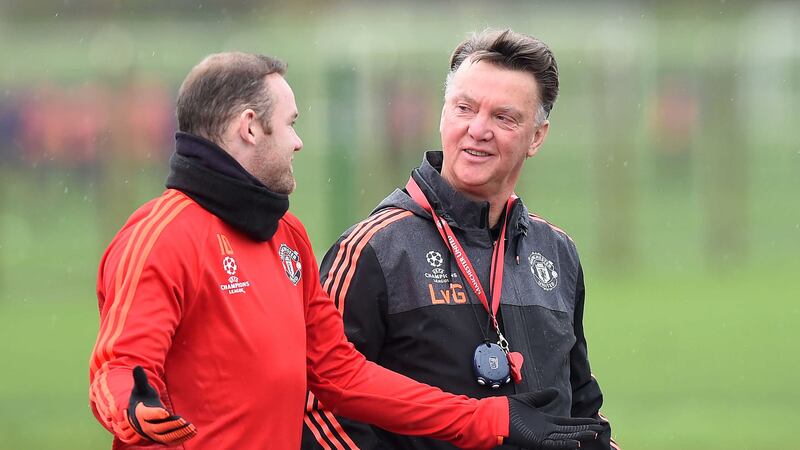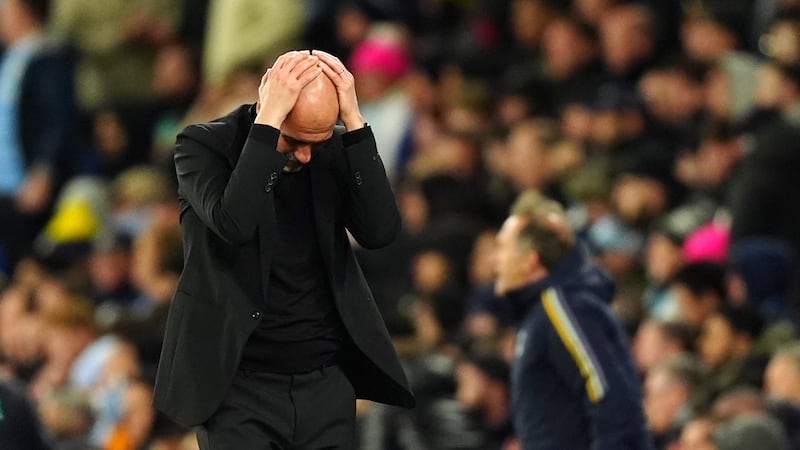YOU can imagine being impressed by Louis van Gaal when he walks into the press room. Every room he enters, he owns. It's an unmistakably Dutch thing. When he speaks, he does with such certainty.
Van Gaal cuts a figure of a man who knows where he's going.
Except that he doesn't.
His press conferences have morphed into a constant defence of his philosophy. While everyone tries to work out exactly what the core principles of the Dutchman's lofty philosophy are, Manchester United fans are unanimous in their conviction that it is far removed from the club's playing traditions.
Of course, Van Gaal could point to the English Premier League table (United sit in third position) - although not their Champions League group - in a bid justify his work this season.
United have conceded just 10 goals in 14 league games. But they also boast the highest percentage of backward passes in the division.
Former Barcelona great Xavi Hernandez once said: "In football, the result is an imposter."
In other words, the manner in which you achieve results is crucially important.
Barcelona hold dear their purist traditions.
So, too, does a club like Manchester United that gave us George Best, Bobby Charlton and Denis Law.
Football fans were naturally drawn to Manchester United, not because they were successful but how they achieved that success.
Alex Ferguson understood the club's traditions and its clear vision.
While his last couple of squads veered away from those evangelical traditions, Ferguson built some brilliant teams, particularly during the 1990s, that played exciting, attacking football.
Ferguson liked to play with wingers. Fast wingers.
The team that featured Paul Ince, Roy Keane, Eric Cantona, Andrei Kanchelskis, Denis Irwin, Steve Bruce, Gary Pallister and Ryan Giggs was probably the most exciting of the lot.
They played with a high tempo, the midfield pressed high and attacked from all angles.
When Ryan Giggs took temporary charge of United following David Moyes's dismissal, he expressed his desire to restore the club's traditions by playing fast football with fast wingers.
A penny for Giggs’ thoughts every Saturday afternoon and every Champions League evening as he sits on Van Gaal’s left shoulder watching a United team that plays as if they're hooked on tranquilisers.
It's hard to know where to start with the failings of the current regime.
After meandering to a pedestrian 1-1 draw with Leicester City last Saturday evening, Sky Sports pundit Jamie Carragher rightly hammered Van Gaal.
The ex-Liverpool star said that United were relying on "one moment" to try and win a game, whereas United teams of the past created at least "12 moments" in games.
Van Gaal's ever-decreasing number of supporters might argue that Manchester United fans are looking at the past through rose-tinted glasses and that the game has become more nuanced.
But the fact is the way United teams played, say, 20 years ago is more relevant than ever.
Playing with a high tempo is absolutely essential to be relevant in the modern game. Van Gaal's United don't play with any kind of discernible tempo.
In effect, Van Gaal's philosophy is anti-modern, bordering on irrelevant.
Its main tenets fly in the face of what makes sense in the modern game. None of the top teams play slow football any more because it's not effective.
For the same reason none of the top teams engage in long passages of passive possession.
Thirty years ago, the Italian and Spanish leagues were derided for playing the game too slowly but at least the prevailing template of the day made sense largely because the back pass to the goalkeeper was permitted.
The old playing rules lent themselves to playing a slower, more methodical game. Nowadays, everyone plays with a fast tempo.
Teams across Europe have embraced the high press game, first introduced to a fanatical degree by Pep Guardiola at Barcelona.
Regularly you see teams closing down the restarts from the goalkeeper with five players in the opposition’s half of the field, all strategically positioned to win back possession as quickly as possible.
Van Gaal has assembled a team that doesn’t have the athleticism or skills set to play this way – and yet he’s spent £200m or more since joining Manchester United at the start of last season.
Leicester City’s goal from Jamie Vardy was a classic illustration of all that is wrong with Van Gaal’s approach.
As Leicester counter-attacked from a United corner-kick, Chris Smalling easily out-paced Bastien Schweinsteiger in a bid to get back into a defensive position. Schweinsteiger struggled to break into a sprint.
Sitting back in a defensive position, Michael Carrick didn’t have the legs to press the Leicester counter-attack and was therefore powerless to do anything other than mark space.
Not a natural defender, Ashley Young was United’s last line of resistance. The result? A Jamie Vardy goal.
In that five-second segment, United’s problems were obvious. Clearly, Schweinsteiger no longer has the mobility to be an effective central midfielder.
Combine the German international with Carrick and Juan Mata and you have a midfield that is slow and ponderous and unable to press and win back possession.
Their default position becomes keeping possession in passive areas of the field. It's the only way they can survive games, particularly Carrick and Schweinsteiger.
Just when it seemed Wayne Rooney’s performances couldn’t plummet any further, he found a new low at Filbert Street last Saturday evening. He looked completely disconnected, lacking energy and confidence.
And for Ashley Young to be part of United’s starting team is further evidence of the club’s deep-seated problems. Young is a player that has made the most of what he has during his career.
He lacks pace and strength but compensates by being able to deliver a good cross. But he isn’t a Manchester United player. He is the wrong profile. He has the wrong skills set.
To compound his limitations, Van Gaal insists on playing him in an unsuited wing-back role.
Tactics aside, few United players are coming close to reaching their potential under the manager.
The self-assured Dutchman insists he knows where he's going. But he may quicken his stride before the club's supporters completely lose faith in what has been a bizarre journey into an irrelevant past.








